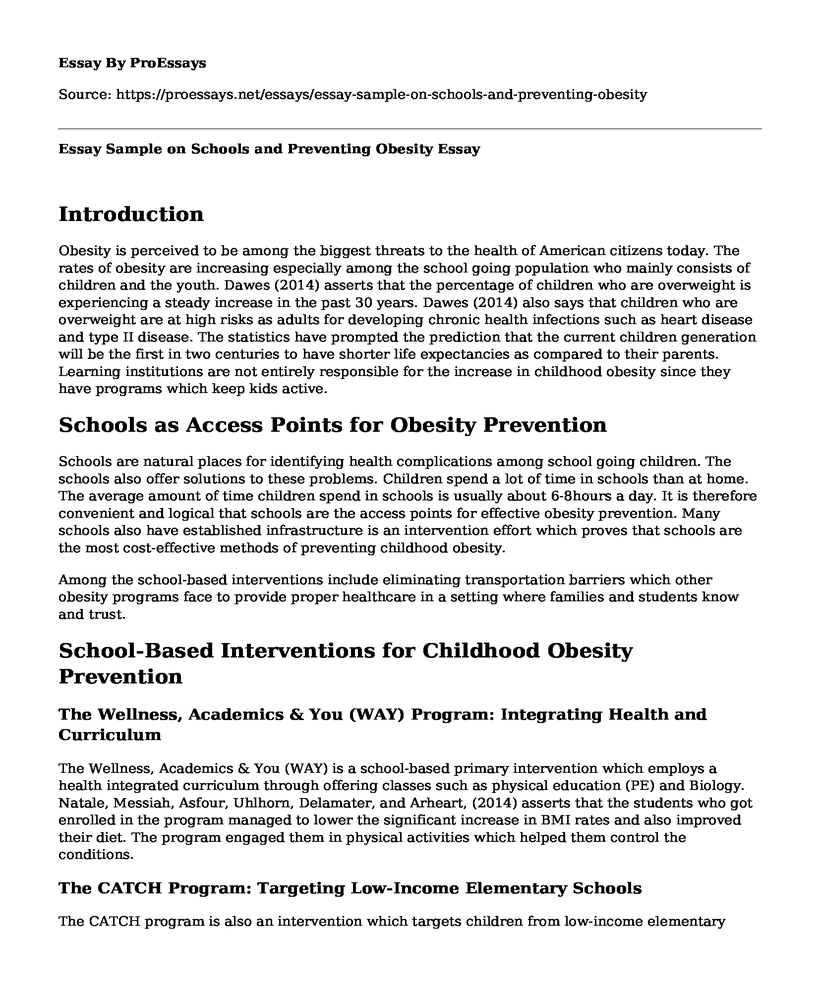Introduction
Obesity is perceived to be among the biggest threats to the health of American citizens today. The rates of obesity are increasing especially among the school going population who mainly consists of children and the youth. Dawes (2014) asserts that the percentage of children who are overweight is experiencing a steady increase in the past 30 years. Dawes (2014) also says that children who are overweight are at high risks as adults for developing chronic health infections such as heart disease and type II disease. The statistics have prompted the prediction that the current children generation will be the first in two centuries to have shorter life expectancies as compared to their parents. Learning institutions are not entirely responsible for the increase in childhood obesity since they have programs which keep kids active.
Schools as Access Points for Obesity Prevention
Schools are natural places for identifying health complications among school going children. The schools also offer solutions to these problems. Children spend a lot of time in schools than at home. The average amount of time children spend in schools is usually about 6-8hours a day. It is therefore convenient and logical that schools are the access points for effective obesity prevention. Many schools also have established infrastructure is an intervention effort which proves that schools are the most cost-effective methods of preventing childhood obesity.
Among the school-based interventions include eliminating transportation barriers which other obesity programs face to provide proper healthcare in a setting where families and students know and trust.
School-Based Interventions for Childhood Obesity Prevention
The Wellness, Academics & You (WAY) Program: Integrating Health and Curriculum
The Wellness, Academics & You (WAY) is a school-based primary intervention which employs a health integrated curriculum through offering classes such as physical education (PE) and Biology. Natale, Messiah, Asfour, Uhlhorn, Delamater, and Arheart, (2014) asserts that the students who got enrolled in the program managed to lower the significant increase in BMI rates and also improved their diet. The program engaged them in physical activities which helped them control the conditions.
The CATCH Program: Targeting Low-Income Elementary Schools
The CATCH program is also an intervention which targets children from low-income elementary schools which includes a large population of Hispanic students. The program integrates components such as health curriculum, nutrition, physical education and involvement of families. Tucker and Lanningham-Foster (2015) explains that during a study of the impacts of the program intercession, outcomes indicated that, two years after the program ended, contributors experienced remarkable intensifications in obesity and the risk of overweight as compared to the children in the controlled group.
School Feeding Programs: Improving Children's Diet and Nutrition
Various schools also have embarked on initiating school feeding programs which integrate nutritional measures as a way of preventing obesity. PerezEscamilla, et al., (2017) agrees that the school feeding programs significantly improve children's diet. Children who take breakfasts and lunch a school have higher chances of mean micro-nutrients intake during meal times, and during the time they engage in school activities. However, most of the children who are part of feeding programs in these institutions are usually from low-income families, and the meals provide a safeguard from hunger.
Eliminating Competitive Foods: Policies to Prevent Unhealthy Snacks at Schools
Competitive foods refer to foods offered for sale at the learning institutions, and the schools do not provide them. The food usually consists of snacks and beverages. The foods are generally of minimal nutritional value such as chewing gums, water ices, soft drinks, jelly beans, and candy. Schools work on eliminating the sale of competitive foods through coming up with policies which prevent people from selling such foods to students.
Child obesity affects the performance of children in learning institutions. Nutrition also affects their academic accomplishments. Herndon (2016) explains that poor nutritional status of the learner interferes with the cognitive function of the student it is also associated with lower academic achievement. Obesity also impairs school performance in various which include health-related absenteeism. Such children also experience joint problems, anxiety and depression, type 2 diabetes, asthma, and sleep apnea.
References
Dawes, L. (2014). Childhood obesity in America. Harvard University Press.Herndon, A. M. (2016).
Childhood Obesity in America: Biography of an Epidemic. The Historian, 78(3), 517.Natale, R. A., Messiah, S. E., Asfour, L., Uhlhorn, S. B., Delamater, A., & Arheart, K. L. (2014).
Role modeling as an early childhood obesity prevention strategy: effect of parents and teachers on preschool children's healthy lifestyle habits. Journal of Developmental & Behavioral Pediatrics, 35(6), 378-387.
PerezEscamilla, R., Lutter, C. K., RabadanDiehl, C., Rubinstein, A., Calvillo, A., Corvalan, C., ... & EwartPierce, E. (2017).
Prevention of childhood obesity and food policies in Latin America: from research to practice. Obesity Reviews, 18, 28-38.
Tucker, S., & Lanningham-Foster, L. M. (2015). Nurse-led school-based child obesity prevention. The Journal of School Nursing, 31(6), 450-466.
Cite this page
Essay Sample on Schools and Preventing Obesity. (2022, Oct 29). Retrieved from https://proessays.net/essays/essay-sample-on-schools-and-preventing-obesity
If you are the original author of this essay and no longer wish to have it published on the ProEssays website, please click below to request its removal:
- Hawaiian Culture and Its Effects on Health
- Quantitative Research Article Evaluation: Fall Prevention in Acute Care Hospitals
- New Approach to Minimize Postoperative Pain in Bariatric Surgery Paper Example
- Essay Sample on Leading a Team of Social Workers to Help War Victims
- Luxury Lifestyle Pre- and Post-Coronavirus: A Global Perspective - Essay Sample
- Gender Inequality: Inequality Rooted in Gender Difference - Report Sample
- Paper Example on Women in Olympics: From 2.2% to a Growing Presence







